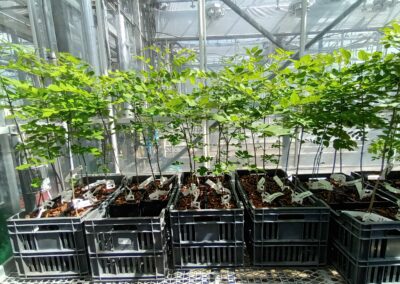Understanding grey squirrel damage in UK woodlands
Alexandra Ash | PhD Researcher | University of Southampton
Contributors/partners
Dr C. Patrick Doncaster | University of Southampton
Dr Rebecca Spake | University of Reading
Dr Chris Nichols | The Woodland Trust
Prof John Pickett | Cardiff University
Charles Dutton | Charles Dutton & Co
Project status Active 2021-2025
Project funding £120K
Context
Previous research has shown how trees are susceptible to squirrel damage, but knowledge of what drives bark-stripping behaviour in grey squirrels is still lacking and current management is ineffective in targeting the behaviour. Gaining insight into the drivers and motivations of the behaviour will aid in the development of effective, humane and targeted management.
Research Aims and Objectives
To establish the drivers and motivations for squirrel bark stripping behaviour.
Project Description
This PhD project will investigate various potential causal pathways of bark-stripping behaviour in grey squirrels, and at each stage of the project aim to narrow down these pathways. It will:
- Identify and organise knowledge gaps within the squirrel bark-stripping literature
- Identify factors of woodland susceptibility to, and drivers of bark-stripping at the regional, landscape and local scales using existing datasets.
- Identify causal mechanisms underpinning bark-stripping behaviour in broadleaved woodlands in southern England.
Outputs
- A thesis plan, preliminary literature review and three annual reports .
- Peer-reviewed papers and technical recommendations for practical application of research.
- A PhD thesis.

40% of British forests have ‘unfavourable’ levels of herbivore damage, which limits the survival of young trees and threatens biodiversity.
Share this project on social media
Related Projects
Our Partners
Social media
Explore
Contact
© 2022 Centre for Forest Protection. All rights reserved.


